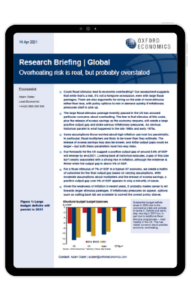Global | Overheating risk is real, but probably overstated

Could fiscal stimulus lead to economic overheating? Our assessment suggests that while that’s a risk, it’s not a foregone conclusion, even with large fiscal packages. There are also arguments for erring on the side of more stimulus rather than less, with policy options to rein in demand quickly if inflationary pressures start to pick up.
What you will learn:
- Multipliers are also likely to be low for other stimulus
categories too, including aid to businesses (well below 1
according to the Congressional Budget Office). - An important component of the argument for overheating is the existence of a large overhang of “excess” savings built up in 2020 due to coronavirus restrictions.
- A key determinant of whether a fiscal package risks overheating an economy is, in theory, the size of the output gap (the difference between actual output and its potential level).
Tags:
Related Services

Post
House prices continue to slide for China’s cities
Research Briefing Global | Overheating risk is real, but probably overstated While the property market downturn has been universal, the scale and depth has been varied for different cities and regions.
Find Out More
Post
The Construction Productivity Challenge in Australia
Delve into the state of construction productivity in Australia. Understand the factors affecting growth and how innovation can transform the industry for the better.
Find Out More